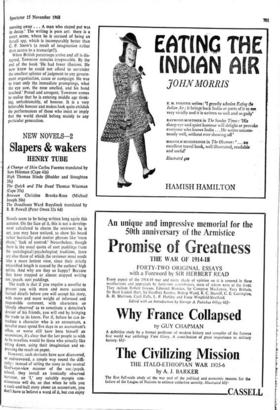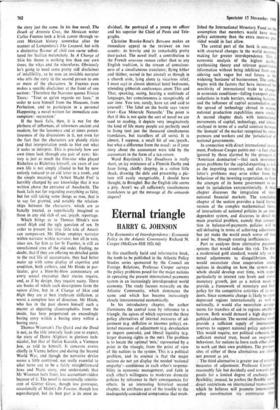NEW NOVELS-2
Slapers & wakers
HENRY TUBE
A Change of Skin Carlos Fuentes translated by Sam Hileman (Cape 42s) High Thomas Hinde (Hodder and Stoughton 35s) The Quick and The Dead Thomas Wiseman (Cape 35s) Between Christine Brooke-Rose (Michael Joseph 30s) The Deadbeats Ward Ruyslinck translated by R. B. Powell (Peter Owen 32s 6d) Novels seem to be being written long again this autumn. On the face of it, this is not a develop- ment calculated to charm the reviewer; he is apt, you may have noticed, to chew his beard rather hectically and mutter phrases like 'mere chaos,' lack of control.' Nevertheless, though there is the usual quota of suet puddings from the sociological/psychological tradition, there are also those of which the reviewer must needs take a more lenient view, since their strictly unjustified length is caused by the authors' high spirits. And why are they so happy? Because they have stopped or almost stopped writing soc./ psych. suet puddings.
The truth is that if you require a novelist to present you with more and more accurate factual details before you will accept his story, with more and more weight of informed and responsible comment, with characters so 'closely observed' as to constitute a detective's dossier of his friends, you will end by bringing the trade to its knees. For if, before he can in- troduce a character who is an accountant, a novelist must spend five days in an accountant's office, or worse still have been himself an accountant, it's clear that the last people to wish to be novelists would be those who actually like sitting down, using their imagination and ex- pressing the result on paper.
However, such deviants have now discovered, or rediscovered, a simple way round the diffi- culty: instead of telling the story in the neutral God's-eye-view manner of the soc./psych. school, they install an ironically observed narrator, an 'I,' any suitably myopic con- sciousness will do, so that when he tells you a cock-and-bull story about an accountant, you don't have to believe a word of it, but can enjoy the story just the same. In his fine novel, The Death of Artemio Cruz, the Mexican writer Carlos Fuentes took a brisk canter through re- cent Mexican history somewhat after, the manner of Lampedusa's The Leopard, but with a distinctive flavour of chili con came substi- tuted for Sicilian melancholy. In A Change of Skin his theme is nothing less than our own times, the whys and the wherefores. Obviously he's going to need some pretty stiff disclaimer of infallibility, so he uses an invisible narrator who tells the story in the second person to one or more of the characters. Sr Fuentes even makes a specific disclaimer at the front of one section: 'Therefore the Narrator quotes Tristan Tzara : "Tout ce qu'on regarde est faux," in order to save himself from the Museum, from Perfection, and to participate in a personal Happening, a novel written for immediate con- sumption : recreation.'
If the book fails, then, it is not for the plethora of influences, of references ancient and modern, for the looseness and at times preten- tiousness of the discussions in it, not even for the fact that the characters are plainly sticks and that interpretation tends to blot out what it seeks to interpret. This is precisely how our own times look through one pair of eyes: his- tory is just as much the film-star who played Richelieu as Richelieu himself, six years of our own life is not simply alluded to but by now entirely reduced to an old letter in a trunk, and the simple meaning of `Arbeit Macht Frei' is horribly changed by our knowledge that it was written above the entrance of AusChwitz. The book fails not for regarding everything as false, but for still taking some things as true, that is to say for granted, and notably the relation- ships between the characters, which are as banally treated, as superficially imagined as those in any old slab of soc./psych. reportage.
Which brings . us to Thomas Hinde's new novel High and the ugly question of sex. In order to present his trite little tale of Ameri- can campus-sex_ Mr Hinde employs narrator within narrator within narrator, but all in vain, since sex, for him as for Sr Fuentes, is still an unreclaimed area of the old order. Feeling, no doubt, that if they are offering no detailed guide to the real life of accountants, they had better make up with some display of expertise and erudition, both authors, and Mr Hinde in par- ticular, give a blow-by-blow commentary on every sexual encounter their stories require, and, as if by design, they require many. There are books of which such descriptions form the raison d'être, but in A Change of Skin and High they are at best irrelevant titillation, at worst a complete loss of direction. Mr Hinde, who has in the past shown himself such a master at depicting claustrophobia from the inside, has here perpetrated an exceedingly boring story within a boring story within a boring story.
Thomas Wiseman's The Quick and the Dead is not, as the title unwisely leads you to expect, the story of Dante Alighieri in glorious tech- nicoloi, but that of Stefan Kazakh, a Viennese Jew, as told to himself. It concerns events chiefly in Vienna before and during the Second World War, and though the narrative device seems a little contrived, not really essential to what turns out to be a fairly straightforward Jews and Nazis story, one understands that Mr Wiseman feels freer, less accountant-ridden because of it. The novel is occasionally reminis- cent of Gunter Grass, though less grotesque, occasionally of Maim's Dr Faustus, though less supercharged, but its best part is its most in- dividual, the portrayal of a young ss officer and his superior the Chief of Posts and Tele- graphs.
Christine Brooke-Rose's Between makes an immediate appeal to the reviewer on two counts: its brevity and its remarkably pretty dust-jacket. The novel itself, a contribution to the French nouveau roman rather than to any English tradition, is the stream of conscious- ness of a simultaneous translator; flying hither and thither, seated in her aircraft as though in a church aisle, lying alone (a vicarious relief, I must say) in almost identical hotel bedroom's, attending gibberish conferences anent This and That, speaking, seeing, hearing a multitude of languages, her consciousness is recognisably of our time. You too, surely, have sat and said to yourself: `The label on the bottle says VICHY Erar—Eau Minerale Naturelle.' The point is that if this is not quite the sort of novel we are used to reading, it depicts very imaginatively the kind of life many people are perfectly used to living (not just the thousand simultaneous translators, but travellers of all sorts), It is almost, I suppose, a small bit of soc./psych., but what a difference from the usual : as if your story about the accountant were told by the accountant in the form of a tax-return.
Ward Ruyslinck's The Deadbeats is really short, an icy miniature of a Flemish Darby and Joan living, chiefly sleeping, in a rotten little shack, drawing the dole and presenting a pic- ture still easily recognisable, I should have thought, to Breughel. But the English title seems a pity. Aren't we all sufficiently simultaneous translators to get the message of De ontaarde slapers?







































 Previous page
Previous page